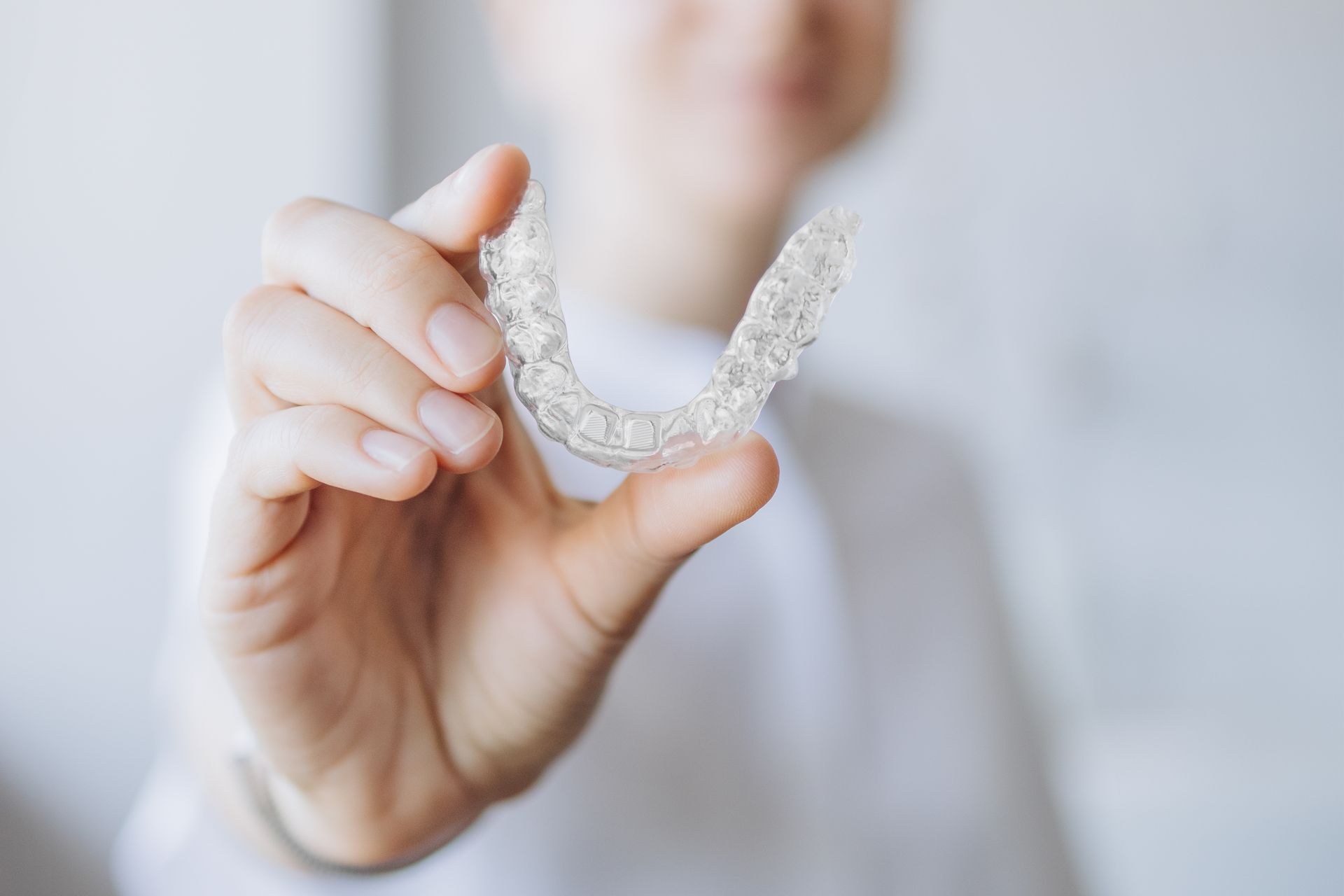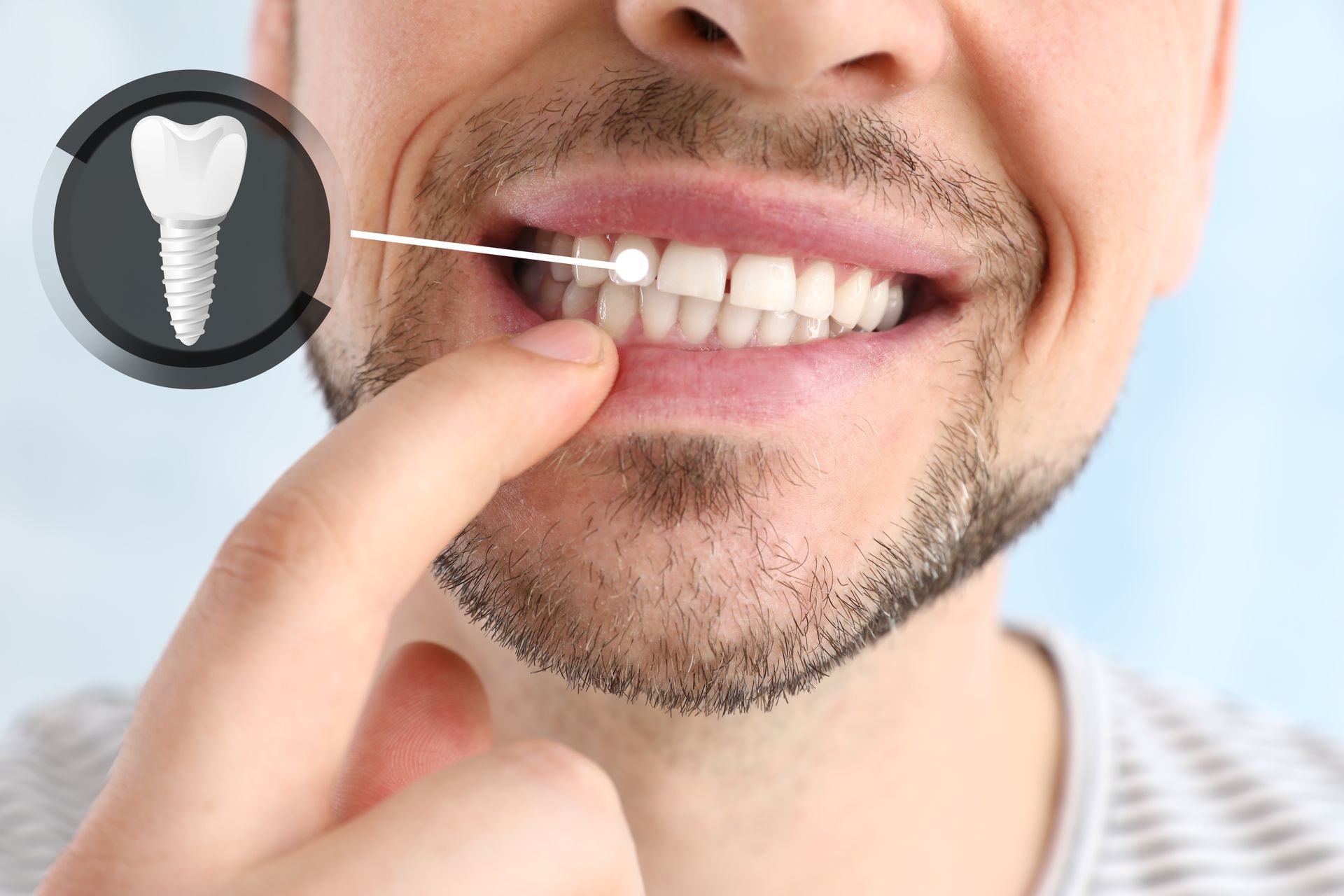Explore our Annapolis Dental Blog

Imagine Your Ideal Smile Close your eyes for a moment and picture greeting an old friend. Does your dream grin appear perfectly aligned, or do you see a luminous, camera-ready surface? Modern cosmetic dentistry can turn either vision into reality with two standout options: Invisalign clear aligners and porcelain veneers . While each solution can elevate appearance and confidence, they achieve results through very different means. Understanding how they work—and what they can realistically do—will help you decide which avenue best suits your goals, lifestyle, and timeline. Invisalign: Subtle Straightening for Natural Alignment Invisalign relies on a series of custom-made, nearly invisible plastic trays that guide teeth into healthier positions. Each aligner set is worn for about one to two weeks, applying gentle pressure that moves teeth fractions of a millimeter at a time. Because the trays are clear, most people around you will never notice you’re in orthodontic treatment. Key Advantages of Invisalign Discretion: No brackets, wires, or metallic glint in photos. Convenience: Aligners are removable for meals and easy brushing, so your oral-hygiene routine stays familiar. Predictability: Digital software maps every stage before you start, letting you visualize progress and final results. Comfort: Smooth thermoplastic minimizes cheek and gum irritation common with traditional braces. Treatment length depends on the complexity of your bite. Mild crowding may finish in as little as six months, while moderate cases often take 12–18 months. After active movement, retainers preserve the new alignment—an essential final chapter for lifelong stability. How Do Veneers Work? Crafting a Flawless Surface If you’re satisfied with general tooth alignment but dislike chips, deep stains, or uneven shapes, porcelain veneers deliver dramatic aesthetic change—often in just two or three visits. How do veneers work in practice? Your dentist removes a paper-thin layer of enamel (usually less than your fingernail’s thickness) to create space for each veneer. Digital impressions and high-resolution photos guide dental ceramists as they layer premium porcelain in natural shades, translucency, and texture. Once bonded, the veneers fuse to tooth structure, forming a resilient, lifelike shell. Key Advantages of Porcelain Veneers Instant makeover: Correct discoloration, cracks, gaps, and minor misalignment in one comprehensive procedure. Lifelike brilliance: Porcelain mimics enamel’s light-reflection, so results look naturally radiant. Stain resistance: Coffee, tea, and red wine are less likely to darken porcelain than natural enamel. Durability: Clinical studies show 94 percent survival at ten years, with many veneers lasting 15 years or longer when cared for properly. Maintenance is straightforward: brush twice daily with a non-abrasive toothpaste, floss gently, and keep up regular professional cleanings. Avoid using teeth as tools or chewing hard objects, and consider a nightguard if you clench or grind while sleeping. Treatment Goals: Alignment vs Aesthetic Refinement Although both therapies reshape smiles, their core purposes differ:' Invisalign is primarily an orthodontic system that moves teeth into healthier, more functional positions. It benefits oral health by improving bite mechanics, reducing abnormal wear, and making flossing easier. Porcelain veneers mask imperfections without changing root or bone position. They’re ideal when tooth color, contour, or minor spacing concerns bother you, yet overall alignment is acceptable. Ask yourself: Do crooked or rotated teeth make it hard to floss, or has your dentist warned about enamel attrition? If so, Invisalign may be the healthier long-term choice. Is tooth shade or small chips what keeps you from smiling broadly in photos? Veneers can provide a faster, more dramatic improvement. Evidence-Based Benefits You Can Trust Decades of research support both treatments: American Association of Orthodontists (AAO) studies demonstrate that clear aligners successfully correct mild-to-moderate crowding with patient satisfaction scores higher than those for fixed braces. A 2023 systematic review in The Journal of Prosthetic Dentistry documented a 94 percent ten-year survival rate for porcelain veneers, crediting advances in lithium-disilicate ceramics and adhesive protocols. American Academy of Cosmetic Dentistry (AACD) surveys consistently show improved self-confidence and quality of life following smile enhancements, whether patients chose Invisalign or veneers. These professional findings underscore the predictability, durability, and psychological lift each option provides when treatment is designed and delivered by experienced clinicians. Benefits at a Glance Invisalign Healthier Bite: By aligning arches, Invisalign lowers risks of TMJ strain and uneven enamel wear. Easier Cleaning: Straight teeth make brushing and flossing more effective, reducing cavity and gum-disease risk. Lifestyle Flexibility: Remove trays for big presentations, sports, or your favorite crab-cake dinner in downtown Annapolis. Porcelain Veneers Versatile Correction: Conceal stubborn stains, chips, and slight overlap in one comprehensive step. Long-lasting Brightness: Porcelain resists stains far better than natural enamel, keeping your smile white longer. Custom Esthetics: Shape, length, and translucency are tailored to complement your face, complexion, and personal style. Your Personalized Roadmap to a Radiant Smile Choosing between Invisalign and porcelain veneers isn’t about which method is “better”—it’s about which aligns with your unique needs and goals. Invisalign straightens teeth discreetly, preserving natural enamel and enhancing long-term oral health. Porcelain veneers offer rapid, transformative cosmetic refinement, perfect for correcting color, shape, and small gaps. Both are backed by robust scientific data and high patient-satisfaction ratings. When you’re ready for a professional opinion—whether you’re googling “invisalign near me” or still wondering how do veneers work —reach out to Aria Dental of Annapolis at 410-280-5370 or visit our welcoming practice at 1610 West St Ste 202 . Dr. Daniel, Dr. Lisa, and our compassionate team will craft a customized roadmap to the smile you’ve been envisioning. Your best grin could be only an aligner tray—or a porcelain shell—away.

Have you paused during a busy day to wonder how a simple two-minute routine can help you avoid hours in a dental chair later? That question lies at the heart of what is preventative and general dentistry—a branch of care focused on stopping problems before they start. By blending at-home habits with routine professional visits, this approach keeps teeth strong, gums healthy, and treatment costs down. Let’s explore the basics so you can use them right away. Defining the Foundations: What Is Preventative and General Dentistry? To put it plainly, what is preventative and general dentistry? It is the umbrella term for all services and habits that stop cavities, gum disease, and other oral issues from gaining a foothold. Regular exams, professional cleanings, diagnostic X-rays, fluoride, and sealants belong here, as do daily brushing, flossing, and balanced nutrition. Together, these steps form a safety net that catches early warning signs long before pain or costly repairs appear. Dentists who practice what is preventative and general dentistry tailor recall schedules and advice to each patient’s risk factors—age, diet, health conditions, and lifestyle choices—all with the same goal: keep natural teeth healthy for life. Daily Habits: Prevention Starts at Home Even the best dentist sees you only a few hours a year. The rest of the time, what is preventative and general dentistry happens in your bathroom and kitchen. Focus on three core habits: Brush twice daily with fluoride toothpaste. The American Dental Association (ADA) links two-minute fluoride brushing with a significant drop in cavity and gum-disease risk. Clean between teeth every day. Floss, interdental brushes, or water flossers sweep away plaque your toothbrush misses. Limit added sugars and acidic drinks. A steady stream of sugary snacks feeds cavity-causing bacteria and erodes enamel. Practice these steps consistently and you live the spirit of what is preventative and general dentistry. Each small act layers protection on the next, turning prevention into your default routine. In-Office Prevention: Professional Services That Make a Difference While home care is the backbone, dentist-directed services complete what is preventative and general dentistry. Key examples include: Comprehensive exams and digital X-rays — allow early detection of decay, tiny fractures, and bone changes that would otherwise stay hidden. Professional cleanings (prophylaxis) — remove hardened tartar your toothbrush can’t reach, smoothing surfaces so plaque has less to cling to. Fluoride treatments — strengthen enamel and can even reverse very early decay spots. Community water fluoridation alone reduces tooth decay by at least 25 percent in children and adults. Dental sealants — thin protective coatings on the chewing surfaces of molars that block food and bacteria. Sealants prevent 80 percent of cavities in those teeth for at least two years and continue offering strong protection beyond that period. When you schedule and keep routine visits, you reinforce what is preventative and general dentistry and give your dentist the chance to adjust strategies as your needs change. Proven Benefits of Preventive Care (What the Research Shows) Curious why experts place so much emphasis on what is preventative and general dentistry? Consider these evidence-based advantages: Up to 80 % fewer cavities in molars with sealants — a quick, painless application protects the back teeth where 9 in 10 cavities form. At least 25 % reduction in decay community-wide with fluoridated water — a cost-effective public-health success that benefits every sip. Twice-daily fluoride brushing lowers risk of cavities and gum disease — reinforcing that home routines matter just as much as office care. Beyond statistics, the practical payoff of what is preventative and general dentistry is a healthier mouth, fresher breath, more confidence, and smaller dental bills over a lifetime. Take the First Step Today In the end, what is preventative and general dentistry comes down to partnership—your daily commitment paired with regular, professional guidance. Brushing, flossing, smart food choices, and twice-a-year checkups may look simple, yet they shield you from the discomfort, cost, and time of major dental work later. Ready to turn knowledge into action? Schedule a preventive visit with Aria Dental of Annapolis at 410-280-5370 or stop by 1610 West St Ste 202, Annapolis, MD 21401 . Discover firsthand how what is preventative and general dentistry can keep your smile strong and bright for years to come.

Can you recall a time when a simple bite turned into a jolt of unexpected pain? It can be startling, and in the moment, you may wonder if it’s serious enough to seek immediate help. Dental issues can appear out of nowhere, and knowing which problems require urgent care can save you time, discomfort, and money in the long run. By understanding “Common Dental Emergencies and How to Handle Them,” you’ll feel more at ease if you ever face a concerning situation. More importantly, you’ll be better prepared to take the right steps for a quick and smooth recovery. Aria Dental of Annapolis is here to help you navigate these unexpected moments. Our practice, led by Dr. Daniel and Dr. Lisa, is located at 1610 West St Ste 202, Annapolis, MD 21401. If you ever find yourself in need of immediate care, give us a call at 410-280-5370. We believe that knowledge is powerful, and in this blog, we’ll explore how to manage urgent dental issues at home before you can get to a professional. We’ll also answer a frequent question: “how do I know if this is a dental emergency?” 1. How Do I Know if This Is a Dental Emergency? When that sudden pain or unexpected swelling shows up, it’s normal to ask, “how do I know if this is a dental emergency?” In general, a dental emergency involves any situation that requires immediate attention to save a tooth, stop ongoing tissue bleeding, or address severe pain. Not every issue you experience with your teeth or gums will demand a trip to an emergency dentist, but there are certain clear signs you should never ignore: Severe Pain: If you have intense discomfort that doesn’t subside with over-the-counter pain relief, you might need urgent help. Persistent Swelling: Swelling, particularly around the jaw or face, could indicate an infection that must be treated quickly. Broken or Knocked-Out Tooth: Time is of the essence in these situations. Acting fast may save your natural tooth. Uncontrolled Bleeding: If bleeding in your gums, tongue, or cheeks doesn’t stop, it’s wise to seek professional care right away. By understanding these warning signs, you can quickly identify when something is beyond home remedies. “How do I know if this is a dental emergency?” is a question many people ask, and these guidelines can help you make an informed decision without losing time when it matters most. 2. Most Common Dental Emergencies There are several common dental emergencies and how to handle them effectively often starts with recognizing what type of issue you’re dealing with. Here are some of the most frequent scenarios: 1. Toothache Tooth pain can range from a mild ache to a sharp, throbbing sensation. It may indicate a cavity, infection, or abscess. Rinsing your mouth with warm saltwater and taking an over-the-counter pain reliever can offer short-term relief. However, if the pain lasts longer than a day or intensifies, it’s crucial to contact a dental professional. 2. Cracked or Broken Tooth Chomping on hard foods or taking an accidental hit to the face can cause a tooth to crack or break. Gently rinse your mouth with warm water to clean the area. If you can find the broken piece, store it in a clean container and bring it with you to your dentist. Getting professional help promptly may prevent further damage or infection. 3. Knocked-Out Tooth A knocked-out tooth is one of the most urgent dental emergencies. If possible, retrieve the tooth by the crown (top part), avoiding the root. Gently rinse it with water but do not scrub or remove any attached tissue. Place it back in the socket if you can, or keep it in a small container with milk. Then, head to the dental office immediately. Timing is critical for successful re-implantation. 4. Lost Filling or Crown Losing a filling or crown can cause tooth sensitivity and leave the area vulnerable to bacteria. While waiting for your appointment, you can use dental cement (available at drugstores) to temporarily cover the tooth. Try to avoid chewing on that side of the mouth until a dentist can restore the filling or crown properly. 5. Abscess An abscess is a severe infection typically located at the root of a tooth or between the teeth and gums. It often presents with significant swelling, pain, and sometimes even fever. Rinsing with saltwater may help draw out some of the infection, but prompt dental treatment is crucial. Delaying care can lead to more serious complications, such as the infection spreading to other parts of your body. 3. Practical Steps to Handle Dental Emergencies While it’s essential to seek professional help for “Common Dental Emergencies and How to Handle Them,” knowing a few basic steps can make a world of difference before you reach your dentist: Stay Calm and Assess the Situation Panicking can make it harder to focus. Take a moment to evaluate what happened and how severe the situation appears to be. Use a Cold Compress If there’s swelling, apply a cold compress on the outside of your cheek. This helps reduce inflammation and may relieve some pain. Rinse Gently For injuries involving cuts or tears in the mouth, a gentle rinse with warm saltwater can keep the area clean while you arrange your dental visit. Locate and Protect Any Broken Pieces Whether it’s a tooth fragment or a crown, try to find and safely store it. Bring it with you to the dental office to see if reattachment is possible. Seek Professional Care Even if pain subsides, an injury could lead to complications later. Arranging a check-up as soon as you can is the best way to ensure thorough care. 4. Benefits of Addressing Dental Emergencies Promptly According to the American Dental Association, timely intervention for dental emergencies can significantly reduce the risk of long-term issues, such as infection spread and permanent tooth damage. Addressing these problems quickly also helps maintain your overall health, given that severe oral infections can impact other parts of the body. Seeking prompt treatment ensures you spend less time in pain and potentially lowers your medical costs in the long run. Prevent Further Damage: Early care often stops the issue from worsening, preserving your teeth and gums. Reduce Pain and Discomfort: Fast action gets you the relief you need before symptoms escalate. Protect Your Overall Health: Untreated dental infections can affect your general well-being, so expert care helps keep you healthier in the long term. Save on Costs: When a problem is addressed in its early stages, you may avoid the need for more extensive treatments later on. Conclusion Knowing how to handle common dental emergencies is the first step toward safeguarding your smile and health. The key lies in being aware of telltale signs—like severe pain, ongoing swelling, or a knocked-out tooth—and taking swift but careful action. If you ever ask yourself, “how do I know if this is a dental emergency?” remember that time, comfort, and safety are crucial factors. When in doubt, it’s always best to consult a trusted dental professional. At Aria Dental of Annapolis, located at 1610 West St Ste 202, Annapolis, MD 21401, Dr. Daniel and Dr. Lisa offer quick and compassionate care for urgent dental needs. We encourage you to call 410-280-5370 the moment you suspect a serious issue. Don’t let uncertainty or discomfort linger—give yourself peace of mind by taking the right steps. With the proper knowledge and a reliable dental team by your side, you’ll face unexpected dental emergencies with confidence.

Have you ever felt your heart pound at the mere thought of sitting in the dentist’s chair? Many people experience this kind of nervousness, often called Dental Anxiety. It can range from mild unease to a more significant fear that prevents individuals from getting the oral care they need. In today’s blog, we will explore several strategies you can use to feel more comfortable, confident, and calm during your next dental appointment. Understanding Dental Anxiety Dental Anxiety is not just a casual worry; for some, it can be a real barrier to maintaining good oral health. When anxious feelings take over, it often becomes easier to cancel or postpone a routine cleaning. Unfortunately, avoiding these checkups can lead to more complex dental issues and more invasive treatments later on. Research published by professional dental organizations shows that a welcoming and supportive environment can greatly reduce Dental Anxiety. At Aria Dental of Annapolis, located at 1610 West St Ste 202, Annapolis, MD 21401, the caring team strives to create a soothing space for every patient. Dr. Daniel and Dr. Lisa understand that even a small amount of tension can keep you from fully benefiting from routine dental visits. The good news is that Dental Anxiety does not have to hold you back. By identifying what triggers your stress, planning ahead, and using some tried-and-true relaxation strategies, you can feel more at ease in the dental chair. This approach not only helps you maintain a healthy smile but also ensures a more positive overall experience. Common Causes and Symptoms Some people find their Dental Anxiety is rooted in past negative experiences, while others feel uneasy because of unfamiliar sounds and sensations. Here are a few of the most common triggers: Fear of Pain : Memories of discomfort from childhood checkups or stories shared by friends can heighten worry. Loss of Control : Sitting in a chair and not knowing exactly what is happening or how long it will last can create distress. Sounds and Smells : The whirr of a dental drill or the clinical smell of antiseptics may trigger an uneasy feeling. Embarrassment : Concerns about having neglected teeth or gums can lead to stress during an exam. Symptoms might include sweating, a racing heartbeat, shortness of breath, or trouble sleeping before an appointment. If you find yourself asking, “What can I do to mitigate dental fear?” the first step is recognizing that your feelings are valid. Talking about your concerns openly with your dental care provider can help you develop a shared strategy to make your visit more comfortable. What Can I Do to Mitigate Dental Fear? When faced with the question, “What can I do to mitigate dental fear?” it helps to remember that preparation and communication are key. By making small changes to how you approach your appointment, you can create a more reassuring experience: Schedule Wisely Book your dental visits at a time of day when you tend to be the most relaxed. For some, an early morning slot helps them avoid worrying throughout the day, while others prefer afternoons when they are less rushed. Find what works best for your schedule and comfort level. Ask Questions Knowledge is often a powerful tool against anxiety. Ask your dentist or hygienist to explain the procedures they will perform. Understanding each step can take away the uncertainty and help you anticipate what is coming next. Bring a Friend or Companion If your dentist’s office allows it, consider bringing a trusted family member or friend. Having a familiar face in the room can be reassuring and help you remain calm. Practice Mindfulness Simple relaxation techniques, such as focusing on your breathing, can help keep you centered. By inhaling slowly through your nose and exhaling through your mouth, you might notice your tension levels drop. You can also visualize a calm place or listen to soothing music during the procedure. Consider Sedation Options Some patients benefit from mild sedation dentistry, which can include nitrous oxide (laughing gas) or an oral sedative. Discuss these options with your dental team to determine what might best fit your needs. By applying these tips, you are taking proactive steps to overcome Dental Anxiety. Remember, the goal is to ensure that each dental visit feels less like a stressful event and more like a regular, manageable part of your healthcare routine. Benefits of Overcoming Dental Anxiety According to various professional sources, including the American Dental Association, addressing Dental Anxiety effectively can bring significant benefits that go beyond a better-looking smile. Here are some key advantages of taking a proactive stance on your dental fear: Improved Oral Health : When fear doesn’t stand in the way, you are more likely to schedule and keep your routine cleanings. Regular checkups allow your dentist to detect issues early, reducing the chance of extensive treatments. Greater Overall Well-Being : Good oral health supports the rest of your body. Research suggests that gum disease can be linked to conditions like heart disease or diabetes. By overcoming Dental Anxiety, you maintain a positive approach to your overall health. Reduced Long-Term Costs : When minor problems are treated early, you avoid the expense of more complicated dental work. This is not only financially beneficial but also saves time and effort. Enhanced Confidence : A healthy smile can boost self-esteem. By managing Dental Anxiety, you can feel more confident about your appearance and more motivated to maintain routine dental care. Additional Relaxation Techniques It is worth repeating that many techniques can help counter anxiety, and discovering which ones work best for you is an essential part of the process. You might explore guided meditation or deep-breathing exercises in the days leading up to your appointment. Another option is journaling: write down your worries and then list possible solutions or coping strategies. By the time you arrive at your dental visit, you will have concrete methods to stay calm. Conclusion Dental Anxiety should not keep you from achieving excellent oral health. By recognizing what fuels your worry, communicating your concerns, and practicing relaxation strategies, you can turn what used to be a stressful chore into a more positive experience. A calm visit to the dentist begins with choosing a caring practice that understands the importance of patient comfort. If you are seeking a dental home that prioritizes relaxation and reassurance, consider Aria Dental of Annapolis. Our office, located at 1610 West St Ste 202, Annapolis, MD 21401, takes pride in providing a welcoming environment for all patients. Dr. Daniel and Dr. Lisa, along with the entire team, are here to answer your questions and tailor the experience to your comfort level. For more information or to schedule a consultation, call us at 410-280-5370. Conquer your Dental Anxiety once and for all, and take the next step toward the healthy, confident smile you deserve!

A bright, white smile is often seen as a sign of health and confidence. If you've been searching for ways to improve the color of your teeth without a trip to the dentist, there are several effective and safe techniques you can try from the comfort of your home. Understanding these methods can help you make informed decisions about your oral care and achieve the results you desire. Why Do Teeth Become Discolored? Before diving into solutions, it's helpful to understand why teeth lose their brightness. Common culprits include: Drinking coffee, tea, or red wine Smoking or using tobacco products Poor dental hygiene Aging, which causes enamel to thin and reveal more dentin Certain medications or medical conditions Now that you know what might be causing discoloration, let's explore effective at-home whitening methods. 1. Whitening Toothpaste One of the easiest and most accessible ways to whiten your teeth at home is by switching to a whitening toothpaste. These products often contain mild abrasives and gentle polishing agents designed to remove surface stains. Some also include hydrogen peroxide or carbamide peroxide, which helps break down discoloration. Benefits: Affordable and easy to use Effective for removing surface stains Can be safely incorporated into your daily routine Pro Tip: Be patient—whitening toothpaste works gradually. Results typically become noticeable after several weeks of consistent use. 2. Baking Soda and Hydrogen Peroxide Paste For a DIY solution, combining baking soda and hydrogen peroxide can be highly effective. Baking soda acts as a mild abrasive that gently scrubs away surface stains, while hydrogen peroxide offers natural bleaching properties to lighten discoloration. How to Use: Mix one teaspoon of baking soda with two teaspoons of hydrogen peroxide to form a paste. Brush your teeth with this paste for 1-2 minutes. Rinse thoroughly with water afterward. Benefits: Affordable and simple to create Effective for surface stains and plaque buildup Caution: Use this method no more than 2-3 times a week to avoid damaging your enamel. 3. Whitening Strips and Gels Whitening strips and gels are popular over-the-counter options that provide professional-level results at home. These products often contain peroxide-based ingredients that deeply penetrate the enamel to lift stains. Benefits: Easy to apply with clear instructions Delivers noticeable results in a short period Widely available in pharmacies and stores Pro Tip: Follow the manufacturer's instructions carefully to avoid gum irritation or sensitivity. 4. Coconut Oil Pulling Oil pulling is a natural method rooted in Ayurvedic medicine that involves swishing coconut oil around your mouth for 10-15 minutes. This technique is believed to reduce bacteria and plaque, which can help maintain a brighter smile. Benefits: Natural and chemical-free Supports gum health and reduces harmful bacteria Freshens breath while promoting overall oral hygiene While coconut oil pulling may not produce instant whitening results, it can enhance your overall oral health and improve the brightness of your smile over time. 5. Activated Charcoal Activated charcoal has become a trendy whitening remedy due to its ability to absorb toxins and stains from teeth. Charcoal powder is used to gently brush the teeth and lift surface discoloration. Benefits: Affordable and easy to find May improve oral detoxification and breath Caution: Charcoal can be abrasive. Use it sparingly (once a week) to prevent enamel damage. 6. Eating Crunchy Fruits and Vegetables Believe it or not, your diet can influence the brightness of your teeth. Crunchy fruits and vegetables like apples, carrots, and celery act as natural scrubbers for your teeth, helping to remove plaque and stains. Benefits: Promotes saliva production, which naturally cleanses teeth Provides essential nutrients for strong enamel and healthy gums Professional Whitening for Long-Term Results While these at-home techniques can improve your smile, professional whitening treatments performed by dental experts like Dr. Daniel and Dr. Lisa at Aria Dental of Annapolis offer the most reliable and long-lasting results. Customized treatments can effectively lift deep stains while minimizing sensitivity, ensuring your smile stays brighter for longer. Tips for Maintaining a Whiter Smile To keep your teeth looking their best, consider these tips: Brush twice a day with fluoride toothpaste Floss daily to remove plaque buildup Limit foods and drinks that stain teeth Schedule regular cleanings with your dentist for optimal oral health Conclusion Achieving a whiter, more radiant smile doesn’t have to involve expensive treatments. By adopting safe and effective at-home whitening techniques, you can improve the brightness of your teeth and boost your confidence. For those seeking dramatic, long-term results, professional whitening treatments remain the gold standard. If you're ready to take your smile to the next level, contact Aria Dental of Annapolis at 410-280-5370 or visit our office at 1610 West St Ste 202, Annapolis, MD 21401 . Our experienced dental team is dedicated to helping you achieve a healthy, glowing smile you can feel proud of.

Did you know that your dental health can have a significant impact on your entire body? While routine dental cleanings might seem like just another appointment to fit into your schedule, they play a far more important role than simply brightening your smile. Understanding the link between dental cleanings and overall health is essential for maintaining a healthy body and mind. How Are Dental Cleanings and Overall Health Connected? Your mouth is the gateway to your body. As a primary entry point for bacteria, maintaining a clean and healthy mouth is vital to your overall well-being. Without proper care, harmful bacteria can build up, leading to oral infections such as gum disease, which in turn can affect other parts of the body. Gum disease, for example, has been closely linked to serious systemic conditions such as heart disease, diabetes, and respiratory problems. During a dental cleaning, harmful plaque and tartar are thoroughly removed, helping to reduce the risk of inflammation and infection that could potentially spread to other parts of the body. Regular cleanings are crucial in preventing these risks, ensuring that oral bacteria do not become a threat to your general health. The Impact of Oral Health on Heart Health One of the most significant connections between oral health and overall health is its impact on the heart. Studies have shown that individuals with gum disease are at a higher risk for developing cardiovascular conditions. When plaque and bacteria from the mouth enter the bloodstream, they can cause inflammation that narrows arteries and increases the risk of heart attacks and strokes. Routine dental cleanings reduce the bacterial load in your mouth, significantly lowering your chances of developing these complications. By maintaining healthy gums through professional cleanings, you are actively protecting your heart as well. Oral Health and Diabetes Management For individuals with diabetes, oral health plays an especially critical role. Gum disease can make it more difficult to control blood sugar levels, creating a dangerous cycle where poor oral health worsens diabetes symptoms, and diabetes itself makes you more prone to gum infections. Regular dental cleanings are vital in this scenario. By controlling gum disease, patients with diabetes can better manage their blood sugar levels and reduce their risk of other related complications. Maintaining optimal oral hygiene significantly contributes to a more manageable diabetic condition. The Link Between Oral Health and Respiratory Conditions The bacteria present in your mouth can be inhaled into your lungs, potentially leading to respiratory issues such as pneumonia and chronic obstructive pulmonary disease (COPD). Individuals with compromised immune systems or existing respiratory conditions are especially vulnerable to this risk. By scheduling regular dental cleanings, you can minimize harmful bacteria in your mouth, lowering the chances of developing or worsening respiratory problems. Benefits of Regular Dental Cleanings Professional dental cleanings provide numerous benefits beyond a clean, fresh smile. According to the American Dental Association (ADA), dental cleanings play a key role in: Preventing Cavities and Gum Disease : Plaque buildup is the leading cause of tooth decay and gum infections. Routine cleanings keep your teeth and gums healthy by eliminating these harmful substances. Detecting Oral Health Issues Early : Dental professionals can spot early signs of oral conditions such as gum disease, cavities, and even oral cancer during your cleaning appointment, allowing for prompt treatment. Reducing the Risk of Tooth Loss : By addressing tartar and plaque buildup before it leads to serious damage, dental cleanings can help you maintain strong teeth for years to come. Boosting Your Immune System : A clean, healthy mouth reduces the spread of bacteria that can compromise your immune system. Fresher Breath and Brighter Smile : Cleanings effectively remove stains and lingering odors, leaving you with a polished, confident smile. How Often Should You Schedule a Dental Cleaning? The American Dental Association recommends scheduling dental cleanings at least twice a year for most individuals. However, those with a history of gum disease, diabetes, or other health conditions may require more frequent visits. Dr. Daniel and Dr. Lisa at Aria Dental of Annapolis can help assess your specific dental needs and create a customized cleaning schedule to maintain optimal oral health. The Importance of Maintaining Oral Hygiene Between Cleanings While professional cleanings are essential, your daily oral hygiene routine plays an equally important role in protecting your overall health. Brushing twice a day, flossing regularly, and using mouthwash can help control plaque buildup and reduce the risk of gum disease. Additionally, consuming a balanced diet low in sugary foods can support your dental and overall well-being. Conclusion: Prioritize Your Oral Health for a Healthier You Your mouth is more than just a smile — it's a vital part of your body's overall health. By committing to regular dental cleanings, you are taking proactive steps to protect yourself from a variety of serious health conditions. At Aria Dental of Annapolis , Dr. Daniel and Dr. Lisa are dedicated to helping patients achieve and maintain healthy smiles that contribute to overall well-being. If you're overdue for a dental cleaning or want to learn more about how oral health impacts your overall health, give us a call today at 410-280-5370 to schedule an appointment. Prioritize your smile and your health — your body will thank you for it.

A confident smile can make a world of difference in everyday life, from enjoying favorite foods to engaging comfortably in social gatherings. Missing one or more teeth, however, can impact daily activities and overall quality of life. Fortunately, modern dentistry offers a transformative solution: dental implants . By providing a stable replacement for lost teeth, implants can restore both function and appearance, helping individuals feel at ease with every bite and every grin. Read on to discover how dental implants work, why they stand out as a reliable treatment, and how regular dental checkups play a vital role in preserving not just your implants but your overall oral health. While this information will help build a general understanding, it’s always best to consult a qualified dental professional for personalized guidance. For those located in or around Annapolis, consider reaching out to Aria Dental of Annapolis (1610 West St Ste 202, Annapolis, MD 21401) at 410-280-5370 to learn more about your dental care options. What Exactly Are Dental Implants? Dental implants are innovative replacements for missing teeth, consisting of a small post (often made of titanium) and a custom-made crown. The post is surgically placed into the jawbone, where it fuses naturally over time—a process known as osseointegration. Once this fusion is complete, a connector called an abutment is attached, and a crown is placed on top. The result is a tooth replacement that closely resembles and functions like a real tooth. Because of their lifelike appearance and durable fit, dental implants are widely regarded as one of the most effective solutions for tooth loss. They do more than simply fill a gap; they help maintain the structure of the jawbone, prevent neighboring teeth from shifting, and support normal chewing and speech. This level of functionality makes them especially popular for those looking for a long-term, reliable solution to missing teeth. Why Patients Should Have Regular Dental Check-Ins According to the American Dental Association (ADA), attending routine checkups is crucial for early detection of potential issues such as tooth decay, gum disease, and changes in the integrity of existing restorations. For individuals with dental implants, these visits allow a dentist to check the stability of the implant, assess the health of surrounding gum tissue, and ensure that the implant continues to perform optimally. By catching minor issues before they escalate, regular professional monitoring can extend the life of both natural teeth and implants, saving time and money in the long run. Key Benefits of Dental Implants 1. Long-Lasting Support One of the biggest advantages of dental implants is their potential for longevity. Because the implant post bonds with the jawbone, it creates a stable foundation that mimics a natural tooth root. With good oral hygiene habits and regular professional checkups, implants can last for many years—even decades—reducing the need for frequent replacement that may be common with alternative treatments. 2. Natural Look and Feel No one wants a tooth replacement that stands out in a distracting way. Dental implants blend seamlessly into a person’s smile, both visually and functionally. The color, shape, and size of the implant’s crown can be customized to match surrounding teeth, ensuring a cohesive look. This natural appearance often leads to increased confidence, allowing individuals to laugh, speak, and eat without worry. 3. Preserving Jawbone Health When a tooth is lost, the jawbone beneath it can begin to deteriorate over time due to lack of stimulation. Dental implants counteract this issue by acting as a substitute tooth root, stimulating the bone and helping to maintain its density. Preserving bone structure not only supports adjacent teeth but also helps retain a natural facial shape. 4. Comfort and Stability Compared to removable dentures, implants provide a level of comfort that many find unparalleled. There is no slipping or need for adhesives, which can sometimes occur with dentures. Patients with implants often enjoy greater freedom in choosing foods and experience less gum irritation, resulting in a more comfortable and secure feel in everyday life. The Implant Process: Step by Step Evaluation and Consultation A thorough evaluation typically starts with a dental exam, X-rays, and possibly a 3D scan to determine the condition of the jawbone and gum tissue. At this point, a dentist will discuss specific goals, overall health considerations, and the feasibility of dental implants as a treatment option. While Dr. Daniel and Dr. Lisa at Aria Dental of Annapolis provide individualized consultations, any qualified implant dentist will aim to personalize treatment according to unique needs. Surgical Placement Once the treatment plan is confirmed, the first major step is placing the implant post into the jawbone. This is usually done under local anesthesia to ensure comfort. Over the following months, the implant fuses with the bone, creating a stable anchor for the eventual crown. Abutment and Crown Placement After the implant post has fully integrated with the jaw, a small connector called an abutment is attached. The final step involves placing a custom-fitted crown over the abutment. Designed to match surrounding teeth in shape and color, the crown completes the process, resulting in a natural-looking replacement that functions just like a real tooth. Common Misconceptions “The Process Must Be Too Painful.” Although the idea of oral surgery can be intimidating, many find the discomfort to be manageable and similar to other minor dental procedures. With modern pain management techniques and sedation options, the process is often smoother than initially expected. “Dental Implants Are Only for the Young.” Age by itself is not a disqualifying factor. While overall health and sufficient bone density matter, individuals in their 60s, 70s, or beyond can still be good candidates for implants. It’s more about oral and medical health than chronological age. “I’ll Need a Long Recovery at Home.” Most patients can resume normal activities shortly after the initial implant placement, although care should be taken to follow post-operative instructions. Over-the-counter pain relievers often help manage any mild soreness, and stitches typically dissolve on their own or are removed during a follow-up. Conclusion: Taking Charge of Your Smile An incomplete smile can affect everything from self-esteem to daily comfort. Dental implants offer a proven, stable, and natural-looking solution that addresses these concerns at their root. Equally important is the commitment to ongoing oral health through regular dental check-ins, ensuring any issues are caught and addressed early. This dedication to prevention will keep both natural teeth and implants in peak condition, safeguarding your overall well-being. For those seeking to learn more about dental implants , scheduling an informative consultation with a trusted professional is a wise next step. If you’re in the Annapolis area, consider contacting Aria Dental of Annapolis at 410-280-5370. With proper care, expert guidance, and consistent preventive checkups, a bright and functional smile can be well within reach. Embrace the possibility of renewed confidence and improved oral health by exploring this transformative treatment option.

Have you ever taken a bite of your favorite snack and felt a twinge of sensitivity that made you pause and think, “Am I really doing enough for my teeth?” We’ve all had those moments of doubt—especially when life gets busy, and oral health falls to the bottom of our to-do list. But the truth is, investing in your dental care doesn’t just brighten your smile; it helps protect your overall health. At Aria Dental of Annapolis, we believe that everyone deserves a comfortable, confident smile. In this blog, we’ll walk through the best practices for dental hygiene and help you answer the pressing question of how to keep my teeth healthy in an approachable, easy-to-follow way. The Importance of Daily Dental Care When it comes to caring for your mouth, there’s no substitute for a solid daily routine. Consistency is everything. Even the best products can only do so much if you’re skipping out on the basics. It’s not uncommon to think that a quick pass with the toothbrush is sufficient, but truly best practices for dental hygiene involve an intentional, thorough approach. Brushing Technique and Frequency Brush Twice a Day : Morning brushing removes the plaque and bacteria that have built up overnight, and brushing at night clears food particles that accumulate throughout the day. Use the Right Technique : Gently angle your toothbrush at 45 degrees against your gums. Move it in small, circular motions rather than scrubbing back and forth. This prevents unnecessary gum irritation while ensuring plaque removal. Two Minutes Is the Magic Number : It can be surprisingly difficult to brush for the full two minutes. Setting a timer or listening to a short song can help. Don’t Forget to Floss Brushing alone doesn’t reach the tight spaces between your teeth. Flossing is key to dislodging trapped food that leads to decay and gum problems. Floss at least once a day, ideally before bedtime. If you struggle with traditional floss, consider floss picks or a water flosser as convenient alternatives. How to Keep My Teeth Healthy with a Balanced Diet We’ve all heard that sugar is the main culprit behind cavities, but the connection between diet and oral health doesn’t stop there. Whether you’re sipping on coffee or crunching on popcorn, every choice you make affects your teeth. Nutrient-Rich Foods Calcium and Vitamin D : Dairy products, leafy greens, and fortified cereals help maintain strong teeth and support jawbone health. Crunchy Produce : Munch on crisp fruits and vegetables like apples or carrots. Their natural fiber content helps scrub away plaque and stimulate saliva flow, which washes away harmful bacteria. Stay Hydrated : Water is vital for rinsing away food particles and keeping your mouth’s pH levels balanced. Limit Sugary and Acidic Foods Frequent exposure to sugar or acidic drinks like soda can wear down enamel over time. If you can’t avoid them, try to consume these items during meals, when saliva production is higher and can help neutralize acidity. Even better—follow up with a glass of water to rinse away lingering sugars. Professional Dental Check-Ins and Cleanings Plaque can harden into tartar, which is extremely difficult to remove without specialized tools. Regular cleaning appointments allow your dental professionals to catch potential issues—like tiny cavities or early gum inflammation—before they become serious (and painful) problems. Benefits of Scheduling Regular Dental Visits According to the American Dental Association, seeing a dentist at least twice a year is crucial for maintaining strong, healthy teeth. Here’s why patients should have regular dental check-ins: Early Detection : Dentists spot problems like tooth decay, gum disease, and even oral cancer in their initial stages, when treatment is more likely to be successful. Deep Cleaning : No matter how diligent you are with home care, professional cleanings remove stubborn tartar and brighten your smile. Tailored Advice : Your dentist can recommend toothpastes, mouthwashes, or other targeted products that address your unique needs—like sensitive teeth or dry mouth. Common Myths About Oral Health Separating myth from fact is key to developing best practices for dental hygiene that actually work. Let’s debunk a few common myths: “If My Teeth Don’t Hurt, I Don’t Have a Problem” Issues like tooth decay and gum disease can progress silently. By the time you feel pain, the problem could be much more advanced. Regular check-ups are vital for staying ahead of issues. “Flossing Is Optional” Flossing might seem like an extra step, but it’s a must for dislodging food and plaque your toothbrush can’t reach. If standard floss is tricky, ask about alternatives like floss picks or water flossers. “Mouthwash Can Replace Brushing” While mouthwash can help kill bacteria and freshen breath, it doesn’t remove plaque. Always treat mouthwash as a supplement to brushing and flossing, not a substitute. “Only Sugary Snacks Cause Cavities” Starchy foods like chips or bread can break down into simple sugars that feed bacteria in the mouth. Balanced meals and moderation go a long way toward protecting your enamel. Benefits of Regular Dental Check-Ins A cornerstone of how to keep my teeth healthy is staying on top of routine dental visits. According to a range of professional dental organizations—such as the American Dental Hygienists’ Association—regular check-ins are tied to better overall oral health outcomes. Here’s a closer look at the benefits: Comprehensive Evaluations : Routine examinations can detect issues like gum recession, enamel erosion, or even signs of systemic diseases that manifest in your mouth. Personalized Treatment Plans : Not everyone’s mouth is the same. Your dentist can tailor treatments based on factors such as genetics, existing fillings, or lifestyle habits (like smoking or high sugar consumption). Improved Quality of Life : Addressing minor issues early helps prevent major procedures down the road. When your teeth feel good, you can enjoy your favorite foods without worry. Whether you’re due for a six-month check-up or just have a lingering question about the state of your smile, Dr. Daniel and Dr. Lisa are here to help you maintain best practices for dental hygiene every step of the way. Conclusion: Your Next Steps to a Healthier Smile A bright, healthy smile isn’t a distant dream. It’s an attainable goal that begins with consistent daily care, a balanced diet, and regular dental visits. By following these best practices for dental hygiene, you’ll be well on your way to enjoying stronger teeth, healthier gums, and the confidence that comes with a truly vibrant smile. At Aria Dental of Annapolis— located at 1610 West St Ste 202, Annapolis, MD 21401—we’re dedicated to helping you reach optimal oral health in the most comfortable way possible. Give us a call at 410-280-5370 to book an appointment and discover a dental experience that’s personalized, reassuring, and focused on your individual needs. Remember: A healthier, happier smile starts with you, and we’re here to guide you every step of the way!



